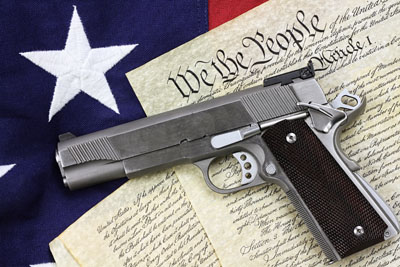2 Lincoln St., New Haven, CT 06510
We speak both English and Arabic - نتكلم العربية
- Contact Our Connecticut Criminal Law Attorneys
- (203) 680-8170
What You Should Know About Your Second Amendment Gun Rights
In April 2018, Connecticut Governor Dan Malloy signed a bill banning bump stocks, trigger cranks, binary triggers, and essentially any part or device causing repeated trigger-function. As a result, gun owners must either get rid of or destroy these devices, which will likely be July 1, 2019.
For those without a carry or eligibility certificate for pistols, revolvers, rifles or shotguns, violation of this rule will be a class D felony for the first offense. For permit holders, the first violation will be a misdemeanor and a felony for a subsequent violation.
Assault weapons and high capacity magazines ban
In 2013, Connecticut passed legislation, which banned assault weapons and made the possession of any weapon meeting the legal definition of an assault weapon a felony. In addition, the legislation outlawed the sale, purchase, or importation of gun magazines holding more than 10 rounds.
While the possession of high-capacity magazines purchased prior to the legislation is not unlawful, these high-capacity magazines must be registered with the state of Connecticut. Additionally, high-capacity magazines may not be transported to or from a shooting range with more than 10 bullets loaded.
Universal background checks
In contrast to other states, which may only require a background check, Connecticut requires a national criminal background check for the sale of long guns as well. In Connecticut, the purchase and sale of long guns are documented similarly to the transfer and purchase of handguns.
To purchase a firearm, prospective gun buyers must apply and receive a certificate of eligibility from the Connecticut Department of Emergency Services and Public Protection (DESPP). If convicted of a felony (or certain other misdemeanors) or having a history of mental illness, the DESPP may deny eligibility certificates for long gun and handgun purchases.
Deadly weapon offender registry
Connecticut has the first deadly weapon offender registry in the nation. The relevant Connecticut law mandates those convicted of a crime involving the use or threatening the use of a deadly weapon to register with DESPP for five years after serving whatever applicable jail time. Those registered with the DESPP are required to have periodic check-ins with local law enforcement, usually occurring once every year.
Connecticut does not require a permit to carry a firearm in one’s own dwelling or place of business. However, outside of these two locations, a gun owner must have a permit to carry, either open or concealed. Connecticut is a discretionary issue state, which means the authorities are not required to grant a permit just because an applicant passed all background checks and eligibility requirements. If Connecticut does not want to grant a permit, they are not required to do so.
However, this discretionary authority is not completely arbitrary because Connecticut uses a list of disqualifying crimes and factors to determine whether to grant a permit. Non-Connecticut residents who have their own respective state-carry permits may apply for a Connecticut permit but are not guaranteed to receive one. Even with a permit, many places exist where gun owners cannot carry in Connecticut, including all school grounds, government buildings, and any private property where the owner has barred the carrying of firearms.
Conclusion
Connecticut has some of the strictest laws regulating the sale and use of firearms. In addition, Connecticut simply has more gun laws than almost any other state in the country with additional gun laws anticipated for in 2019. Connecticut lawmakers have already passed legislation banning the sale of assault rifles and high-capacity magazines, in addition to additional registration requirements. Previous legislation also includes expanding the definitions of banned and stringently regulated firearms and ammunition, placing more burdens on legal ownership of a gun.
In addition, Connecticut highly regulates the process for purchasing long guns and handguns with many factors disqualifying people from receiving a permit to purchase a firearm. Violation of any of these gun laws can have very severe consequences, including the possibility of a felony conviction.
Call us at (203) 624-6115 for more information from Knight & Cerritelli or to schedule a consultation in our office in New Haven.
NOTE: This is for informational purposes only and does not constitute legal advice.
Check out what others are saying about our services on Yelp: Read our Yelp reviews.
[recent-blogs count=”4″ layout=”horizontal”]


